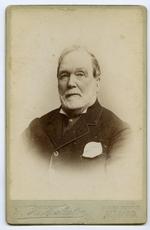Henry Noble (1816-1903), the Isle of Man's most recognisable public benefactor, was born in the village of Clifton, Westmoreland. He was the son of John Noble, a farmer and Mary née Bloom (later in life Henry adopted Bloom as a middle name). Moving to Whitehaven as a young boy Noble excelled at school. After leaving education he obtained a position at a well-respected firm, Spittall's Wine and Spirit Merchants, which also had premises in Douglas, Isle of Man. In 1835 he (and his mother) moved to Douglas signifying the beginning of Noble's illustrious and wealthy career. Working in the Douglas Spittall's, Noble became manager within five years and by his twenty-fifth year had established his own rival business, a Wines, Spirits and Timber Merchants; he also had ties to property speculation, money lending and later on was the owner of a fleet of schooners.
In his early 40s Noble was reputed to be the richest man on the Island, yet still unmarried. In 1862 he married Rebecca Thompson (1818-1888). By 1865 Noble (and four other businessmen) had founded the Isle of Man Banking Company. In 1868 he paid £7,750 for the Villa Marina mansion on Douglas seafront, former residence of Francis Stainsby-Conant-Pigott (1810-1863), Lieutenant Governor of the Isle of Man (1860-1863). During his lifetime (and beyond) Noble was a public benefactor to the Island; his most notable development was the foundation and endowment of Noble's Isle of Man Hospital on Crellin's Hill, Douglas which opened in 1888; this building now forms part of the Manx Museum. 1888 also saw Noble invest a significant amount of money (£20,000) in the struggling Isle of Man Steam Packet Company, thus saving it from collapse. In 1900 the Isle of Man suffered a banking crisis; Dumbell's Bank collapsed and ruined many investors and tradesmen businesses. To increase the credit of Douglas, Noble loaned £40,000 of his money to his own bank, restoring the confidence in the bank and its clients. Noble died on 2 May 1903 at Villa Marina. His memorial is in Braddan churchyard.
At the time of his death Noble was worth over £270,000 (more than £10 million in today's money). He held the mortgages on forty-two properties and had stocks and shares in forty-two companies, including the Isle of Man Banking Co., Douglas Light Co., Isle of Man Steam Packet Co., Great Laxey Mining Co., Snaefell Mining Co., Douglas Town Stock and Ramsey Town Stock. He had nearly £10,000 in cash at the bank. He owned thirty-three houses, twenty shops, thirteen gardens and twenty-nine plots of land. Noble's will instructed to leave the majority of his wealth to charity and his estate was left to the disposal of Trustees, who distributed it out to various causes. The five original Trustees to whom probate of the will and codicils was granted were William Lefroy (1836-1909), DD Dean of Norwich, Alexander Hill (c.1862-1915), Manager of the Isle of Man Banking Company Ltd, Robert Clucas (c.1844-1924) Member of the House of Keys (MHK), Llewellyn Stanley Kneale (c.1864-1926), Advocate and Samuel Harris (1815-1905), High Bailiff of Douglas. The original Trust secretaries were John Hattersley Clarke (1868-1920), Noble's agent and Alfred Kicks Tyson (1874-1946), advocate's clerk. The Trustees gradually auctioned or sold Noble's properties; the remainder were leased out or opened for public use, notably the Villa Marina was sold to Douglas Corporation and reopened as an entertainment complex. The Trustees invested in causes such as the Island's public health, education, welfare, recreation and the Manx Church. Noble's money provided the Island with a new hospital on Westmoreland Road, Douglas (1912) and the Ramsey Cottage Hospital (1907).
Other initiatives included scholarships at King William's College, Castletown, and the University of Liverpool. Noble's Trustees ensured money was left to the House of Industry, Douglas, with free dinners provided for the poor school children in Douglas. Recreational facilities were provided: Noble's Park, Douglas, was opened in 1909 and Noble's Baths, Douglas, provided bathing facilities to the community from 1908 until 1969 (free of charge to school children). Noble's money enabled the construction of the Anglican Church of St Ninian's, upper Douglas. Henry Bloom Noble had a major impact on Island life and his name and legacy lives on in Island institutions to this day.

